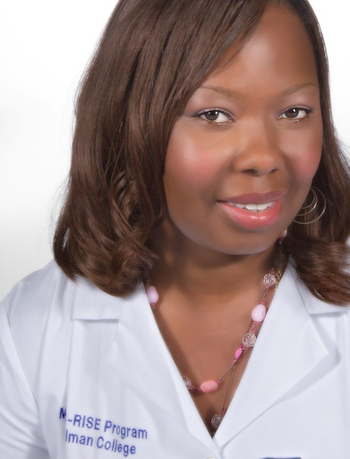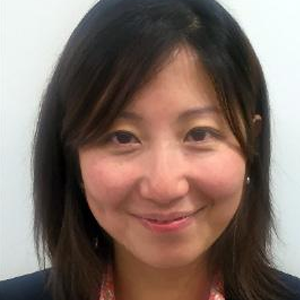Q&A with Leyte Winfield
 Tell us about your current career position.
Tell us about your current career position.
I am an associate professor and chair of the department of chemistry at Spelman College. As chair, daily administrative tasks include advising, overseeing the budget and developing the course schedule within the department. I also work as an advocate for faculty and students and work collaboratively with my colleagues to ensure that we continue to offer a rigorous curriculum that prepares future scientists. As associate professor, I serve as a teacher, scholar and mentor. The courses I teach are organic and medicinal chemistry. My research involves the design, synthesis and biological analysis of anticancer drugs. I have mentored individuals of various backgrounds, disciplines and education levels, including K – 12. I strive to expose people to the beauty and versatility of chemistry and to nurture the potential of women of color interested in pursuing a degree in chemistry.
What are the key experiences and decisions you made that have helped you reach your current position?
Participating in an undergraduate research project was instrumental in my decision to pursue a career in research. As I shared my interest with my professors, they were able to help me focus my interest and select an appropriate career path. In graduate school, I found myself committed to the success of other African-American students. Each year, as the next one entered the program, I became his or her unsolicited mentor. It soon became evident that I had an enormous passion for mentoring and helping others succeed. I believe this was a defining moment in my life, as I eventually became a college professor.
How did you first become interested in science?
As a preteen, I was obsessed with trying to improve consumer products. My interests included developing lotions that would last longer than the walk to the bus stop, creating acne remedies that worked before the beginning of the next school term, mixing various colors to create the perfect hue of red and evaluating the effectiveness of stain removers. All of my early projects were epic fails. Nevertheless, I entered high school with a firm passion for chemistry. During a career-day presentation, a presenter talked about his job creating new medicines and improving old medicines. He was a chemist, a pharmaceutical chemist to be exact. His presentation was fascinating, and it solidified my passion for chemistry.
Were there times when you failed at something you felt was critical to your path? If so, how did you regroup and get back on track?
Failure is part of the process. It was important for me to keep this in mind. I have failed in areas that I thought would mean the end of my career aspirations. It was my faith in God that allowed me to overcome my disappointment, address what went wrong and move on. Remembering what I was trying to accomplish and placing the situation in perspective helped me identify how to move beyond the failures.
What advice would you give to young persons from underrepresented backgrounds who want to pursue careers in science similar to yours?
Learn all you can, experience all you can and go for it. Find programs that allow you to get hands-on experience in science. If you are young, this may mean going to a science museum or a science summer camp. If you are a high-school student, check your local colleges for research and apprenticeship opportunities. For college and graduate students, I would say to take advantage of any global opportunities that are available (study travel, study abroad, service learning, etc.). Seek research opportunities that will allow you to explore different types of research environments (government, industrial and academic). By all means, become a member of the professional organizations in your field. It is important, regardless of the career choice, that you have a mentor in the field. He or she can provide invaluable guidance in your chosen field.
What are your hobbies?
Traveling, reading nonacademic literature and trying new activities – zip-lining, hiking, boxing, dancing, painting.
What was the last book you read?
“Sister Citizen: Shame, Stereotypes, and Black Women in America” by Melissa V. Harris-Perry, “Changing Forward: Experiencing God’s Unlimited Power” by Bishop Paul Morton, and “Searching for Tina Turner” by Jacqueline E. Luckett.
Do you have any heroes, heroines or role models? If so, describe how they have influenced you.
My mom is my hero and greatest inspiration. She exemplifies courage under fire. She is beautiful, resilient, dedicated and loving. She has a drive and a work ethic that is impossible to keep up with.
What is it that keeps you working hard and studying science every day?
I’m a doodler. However, I don’t draw fancy letters or cartoons; I draw molecules. I have countless journals filled with compounds. For each, I am eager to develop a synthesis for their preparation and to conduct computational studies to determine their potential utility. It is exciting to envision molecules that could potentially impact so many lives. As previously stated, my research focuses on cancer drug development. Many cancers disproportionately impact the African-American community in comparison to other populations. I am dedicated to finding ways to reduce this disparity.
Finally, I love being in a position to nurture and influence future scientists. Working hard allows me to be the best possible example for my students. My hope is that, in seeing my success, they will be inspired to excel in their own right.
Enjoy reading ASBMB Today?
Become a member to receive the print edition four times a year and the digital edition monthly.
Learn moreGet the latest from ASBMB Today
Enter your email address, and we’ll send you a weekly email with recent articles, interviews and more.
Latest in People
People highlights or most popular articles

2026 ASBMB election results
Meet the new Council members and Nominating Committee member.

Simcox wins SACNAS mentorship award
She was recognized for her sustained excellence in mentorship and was honored at SACNAS’ 2025 National Conference.

From humble beginnings to unlocking lysosomal secrets
Monther Abu–Remaileh will receive the ASBMB’s 2026 Walter A. Shaw Young Investigator Award in Lipid Research at the ASBMB Annual Meeting, March 7-10 in Washington, D.C.

Chemistry meets biology to thwart parasites
Margaret Phillips will receive the Alice and C. C. Wang Award in Molecular Parasitology at the ASBMB Annual Meeting, March 7-10 in Washington, D.C.

ASBMB announces 2026 JBC/Tabor awardees
The seven awardees are first authors of outstanding papers published in 2025 in the Journal of Biological Chemistry.

Decoding how bacteria flip host’s molecular switches
Kim Orth will receive the Earl and Thressa Stadtman Distinguished Scientists Award at the ASBMB Annual Meeting, March 7–10, just outside of Washington, D.C.

